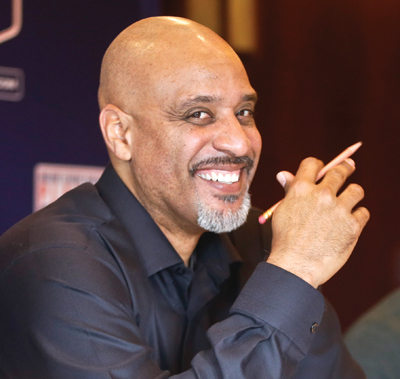Last week the Major League Baseball Players Association, a union known for being led by brilliant lawyers, elected a former player who is not a lawyer as its fourth executive director since 1966.
But those who know Tony Clark, an All-Star first baseman before becoming a union executive, say no lawyer — or anyone else, for that matter — is a better man for the job.
 |
Labor experts say Tony Clark’s leadership abilities more than make up for not having a law degree.
Photo by: AP IMAGES
|
“I have known Tony a long time, probably 20 years now,” said NHL Players’ Association Executive Director Don Fehr, formerly the MLBPA’s executive director. “He is, by every measure, an extraordinary leader. He is a very smart guy. He understands what the union is about, and if the players have confidence in him — and they do — then I do.”
The executive board of the MLBPA voted unanimously for Clark at the union’s annual meeting last week in San Diego. Clark retired from a 15-year playing career in 2009 and has been intensely involved in the union, first as a player representative and then as one of two association representatives, before being hired as director of player relations in 2010 and promoted to deputy executive director in July. He succeeds Michael Weiner, who died Nov. 21 of brain cancer.
Weiner was a lawyer, as is Fehr.
Clark, in a conference call last week with reporters, said he was humbled and honored to be chosen and noted that he would be aided in his new position by a qualified legal staff. “Inevitably the final decision will be mine, with the perspective that I have, despite not being a lawyer,” Clark said. “But having the staff on hand and having the access to those who do have that law degree and an understanding of the legal dynamics will provide us with the support we need beyond me not having a law degree on the wall.”
Clark, Fehr and MLB agent Scott Boras pointed to the late Marvin Miller, an economist who led the MLBPA from 1966 to 1982. “Marvin Miller, without being a lawyer, had the services of hiring skilled labor lawyers in Dick Moss and Gene Orza and Don Fehr to assist him in growing the union into the force it is today,” Boras said.
As a former player, Boras said, Clark brings different strengths. “He understands locker room leadership,” Boras said. “He understands player accountability. He understands what players’ needs are to achieve success in their careers, both economically and on the field.”
Lawyers have led the four major sports unions in recent years, including Fehr’s predecessors at the NHLPA. The most recent executive director of the National Basketball Players Association, Billy Hunter, is an attorney. The NFL Players Association’s executive director, DeMaurice Smith, is also an attorney, although his predecessor, Gene Upshaw, who led the football players union for 25 years until his death in 2008, was a former NFL player who did not have a law degree.
Fehr noted that a lot of people think the leader of a sports union should be an attorney and he conceded, “I am not going to say that doesn’t bring something to the position.”
But Fehr noted there are intangible qualities that trump a law degree.
“The most important thing to bring to the job is that you understand and can communicate with and have the confidence of the players,” Fehr said. “You can be the best lawyer in history, but if you don’t have the trust and the confidence of, and the ability to lead the players, you can’t do the job.”
MLBPA association representatives Curtis Granderson and Jeremy Guthrie last week praised Clark’s leadership abilities and noted that he has been intimately involved in the last three collective-bargaining negotiations.
Steve Fehr, Don Fehr’s brother, who is longtime outside counsel to the MLBPA, said, “During his career, no player was more active in the MLBPA than Tony.”
C.J. Nitkowski, a retired MLB pitcher who played with Clark, said Clark was respected by other players for his work ethic, teamwork and ability to stay calm during a long baseball season when it seemed everything was going wrong. Clark “never complained. Never made excuses. Any manager who ever had him will tell you that,” he said.
Nitkowski added that although players knew that Weiner was a brilliant lawyer, one of the things they liked most about him was that he talked the same way to a star player making $25 million a year as a guy who was just called up to the majors.
“He made you feel you were part of the group, and that is one way I think Tony is like Michael Weiner, in that regard. You are one of us, no matter who you are.”




